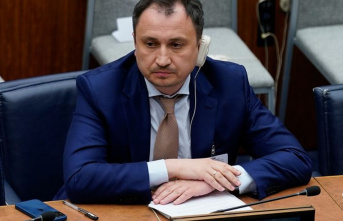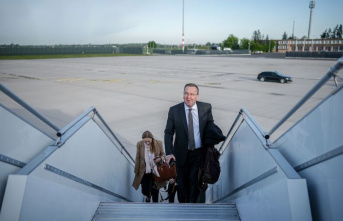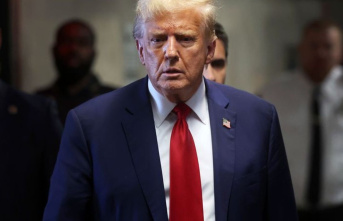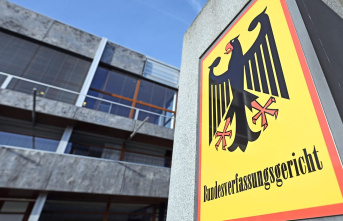Emmanuel Macron started talking - and was severely abused for it. In an interview, France's President revealed how his country would react to a Russian use of nuclear weapons in the war against Ukraine. In short: at least not with nuclear weapons.
The French nuclear doctrine is based on the "fundamental interests of the nation," he said in an interview with the French television channel France 2 on Wednesday evening. These would "not be directly affected if, for example, there were a ballistic nuclear attack on Ukraine or in the region".
Macron's unequivocal statement is noteworthy because it breaks with a fundamental principle of nuclear deterrence: deliberate ambiguity to keep the adversary in the dark about when nuclear weapons might be used. The goal: The reaction to a nuclear escalation should be kept unpredictable.
Critics are now complaining that Macron has moved away from this strategy by spelling out some of the French considerations and thus giving up important deterrent potential.
France is the only nuclear power within the European Union and one of three nuclear-armed NATO countries, making it a central component of the Western deterrent against Russia. Accordingly, Macron's statements were also registered in the defense alliance.
On Thursday, the NATO defense ministers also discussed the latest threats from Russia's president at a meeting classified as secret (read more here). All NATO countries were involved - with the exception of France, which has relied on the principle of "nuclear independence" for decades and is therefore not a member of the so-called nuclear planning group.
Macron's statements run counter to Western strategy. The timing also raises question marks among experts.
After the confidential consultations on Thursday, NATO Secretary General Jens Stoltenberg again emphasized the alliance's strategy of not letting anyone look at the cards: "We will not go into how exactly we will react," he said. Only this much: "There will be serious consequences if Russia uses any kind of nuclear weapon against Ukraine."
A vague but unmistakable message to Moscow, which is in line with the old policy of deterrence - and is also formulated by US President Joe Biden, who eloquently invoked a nuclear Armageddon (read more about it here).
The background to this is Putin's repeated warnings that he intends to use "all available means" in the war against Ukraine if Russia's "territorial integrity" is threatened. In the West, his words were read as the clearest threat yet to use nuclear weapons. Recently, concerns about such a step have grown.
After several failures by the Russian army, Putin is under (successful) pressure, while criticism of his conduct of the war is growing. Against this background, the brutal bombardment of civilian infrastructure was also seen as a sign of his "powerlessness", after all his escalation options - before the greatest possible nuclear escalation - would have been largely exhausted, say military analysts (read more about this here).
Under this impression, NATO began its annual training maneuvers to defend the European alliance area with nuclear weapons on Monday. In contrast to previous "Steadfast Noon" exercises, this year NATO will be providing information about the start - obviously so as not to further aggravate the tense situation. The alliance also emphasizes that this year's training is not a reaction to the Russian war of aggression and that no live weapons will be used.
France does not take part in the exercise maneuver. Put simply, the national nuclear doctrine stipulates that France alone and the President alone decide on the use of French nuclear weapons. As a result, military expert Tertrais gave Macron every right to speak about the doctrine as commander-in-chief. However, he expressed doubts as to whether this was a wise decision.
Has Macron looked too deeply into the sheet? The Élysée Palace apparently wants to get rid of this impression. The use of nuclear weapons is a sovereign decision by the French President," "Bloomberg" quoted an insider from the French government apparatus. However, Macron adheres to "strategic ambiguity", i.e. deterrence through deliberate ambiguity, and continues to stand by his statements on the 2020 nuclear doctrine.
At the time, Macron had declared that the French nuclear forces also had "a European dimension", although he rejected a common European deterrent. An Elysée official also told the "Financial Times" that his most recent statements represented a change in policy. In addition, France's defense obligations to the NATO countries would continue to apply.
But what does this mean for Ukraine? The country belongs neither to NATO nor to the EU - but borders on European territory. According to Macron's words two years ago, a Russian use of nuclear weapons in Ukraine could have a "European dimension" that would also attract France's attention. According to his recent statements, however, the national nuclear doctrine would not apply in the event of an attack in Ukraine or in the region. In this respect, the French President is certainly causing the confusion that is in line with the policy of deterrence.
From the French point of view, Macron was above all too talkative. "When I heard him speak, I almost fell off my chair," Politico quoted Conservative MP Jean-Louis Thiériot as saying. Macron's information about the French strategy was a "political error" because it contradicted a principle of nuclear deterrence. In his view, Macron wanted to send a message to domestic voters who were increasingly concerned about the potential threat of nuclear war.
Quellen: "Politico", "Bloomberg", "Financial Times", France 2, "Le Figaro", FranceInfo












